|
|
|
Sort Order |
|
|
|
Items / Page
|
|
|
|
|
|
|
| Srl | Item |
| 1 |
ID:
132034
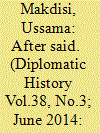

|
|
|
|
|
| Publication |
2014.
|
| Summary/Abstract |
The question of how to represent the U.S. role in the Middle East brings to the fore the question that Edward Said first raised in 1978 in Orientalism about the nature of American understandings of the Middle East. More than three decades after the publication of his book, Said's criticism of Orientalist scholarship-and his accompanying plea for a secular humanistic interpretation to replace it-remain both topical and enigmatic. It is one thing to criticize American representations of foreign cultures; it is an entirely different matter to study American engagements with them. These are by no means unrelated endeavors, but by the same token, they entail very different conceptions of what constitutes a field of inquiry and how to go about studying it comprehensively. The recent emergence of a more critical scholarship of America and the Middle East, therefore, begs the question of whether it is possible to write a history that takes both the Americans and Arabs equally seriously despite the prevailing political climate, and ultimately what kind of methodology this might entail for the rewriting of U.S.-Arab relations, and more broadly, American involvement in the world.
|
|
|
|
|
|
|
|
|
|
|
|
|
|
|
|
| 2 |
ID:
131480
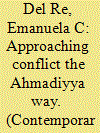

|
|
|
|
|
| Publication |
2014.
|
| Summary/Abstract |
The role and incidence of the Ahmadiya community in Israeli society, with its around 2,000 members, is not related to the dimension of the community, its religious activities or its dissemination on the territory. It is related to the strong social and political engagement of the community not only in religious but also in civil society activities where it resides, despite all the difficulties that derive from its disputed role in Islam. The Ahmadiyya community in Haifa constitutes a relevant example of contribution to peaceful and productive coexistence. Haifa itself is characterized by a very interesting social and political climate, by which it is considered a "model" of coexistence in Israel, despite the fact that many contrasts and contradictions persist, such as forms of discrimination and inequalities. The civil society is particularly active, and institutions and NGOs devoted to the Arab-Jewish dialogue are many. Religious and political leaders communicate and participate together in various events, where their openness and mutual respect are intended to symbolize harmony with the intent of this being mirrored by the whole society. The Ahmadiyya Community plays an active role in this evolving process. The author, who has carried out qualitative research in Haifa to film a scientific documentary on the Holiday of Holidays and the validity of the Haifa model of coexistence, applied participant observation in the framework of grounded theory to analyze the role and impact of the Ahmadiyya community in the complex Israeli context, also on the basis of extensive in depth interviews with community members and leaders
|
|
|
|
|
|
|
|
|
|
|
|
|
|
|
|
| 3 |
ID:
131130
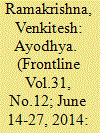

|
|
|
|
|
| Publication |
2014.
|
| Summary/Abstract |
In the new political climate, there is a pronounced assertiveness among Sangh Parivar outfits on core Hindutva programmes, including the construction of a Ram Temple in Ayodhya.
|
|
|
|
|
|
|
|
|
|
|
|
|
|
|
|
| 4 |
ID:
134209
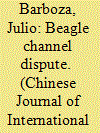

|
|
|
|
|
| Publication |
2014.
|
| Summary/Abstract |
The Beagle Channel dispute between Chile and Argentina presented great challenges to them. An award delivered by an arbitral tribunal did not manage to settle it. The crisis after the award brought the States to the brink of war. Only tenacious efforts by the Holy See to mediate between these two largely Catholic nations managed to calm tensions as well as a change in political climate allow the parties to finally settle the dispute. This paper describes and analyses the background to the dispute, the principles and arguments involved in the dispute, the decision of the Court of Arbitration, the crisis following the award, the papal mediation and the events that finally brought the dispute to an end. Some general comments will be offered in the last section.
|
|
|
|
|
|
|
|
|
|
|
|
|
|
|
|
| 5 |
ID:
155928
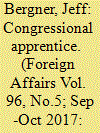

|
|
|
| 6 |
ID:
119557
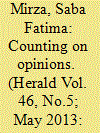

|
|
|
| 7 |
ID:
131335
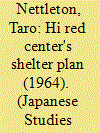

|
|
|
|
|
| Publication |
2014.
|
| Summary/Abstract |
This essay considers the relationship between the Japanese Fluxus-affiliated collective Hi Red Center's performance event Shelter Plan (1964) and Frank Lloyd Wright's Imperial Hotel, in which the event was staged. In the year of the Tokyo Olympics and the heralding of the end of the post-war era for Japan, Shelter Plan, which involved the production of tailor-made bomb shelters, rejected the ideological function of the Tokyo Olympics, and the increasingly repressive political climate that accompanied it. I argue that Shelter Plan needs to be understood as a site-specific response to one of Frank Lloyd Wright's major works. As successor to a lineage of hotels designed to house Western visitors in Japan, and imagined by Wright as an opportunity to bring the Japanese 'off their knees' and into modernity, the Imperial Hotel was a highly charged site for addressing the politics of intercultural exchange between Japan and the West.
|
|
|
|
|
|
|
|
|
|
|
|
|
|
|
|
| 8 |
ID:
105678
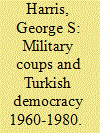

|
|
|
|
|
| Publication |
2011.
|
| Summary/Abstract |
He proclaimed, "We resemble ourselves." Nowhere is that more true than in regard to the Turkish military's role in politics. As many have pointed out, the Turkish armed forces have not behaved as a South American model might have suggested. Nor have they acted as Middle Eastern or North African military establishments would have. Instead the institution has taken a course consistent with Turkey's history and culture.
|
|
|
|
|
|
|
|
|
|
|
|
|
|
|
|
| 9 |
ID:
129037
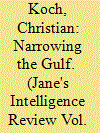

|
|
|
| 10 |
ID:
126693
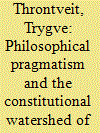

|
|
|
|
|
| Publication |
2013.
|
| Summary/Abstract |
AS THE DUST STILL SWIRLS, ENDLESSLY IT SEEMS, around the 2012 election, it is worth reexamining its predecessor of a century ago: the epochal election of 1912. Granted, 1912 was a four-way race, pitting Democratic and Republican nominees against challengers from the Socialist and Progressive Parties-a far cry from today's bipolar contests. Yet then as now, the political climate was highly charged, and the main question dividing the nation essentially the same: How should government protect freedom and promote opportunity while reducing inequality and ameliorating its effects? These general similarities suggest two particular reasons to study the course and consequences of the 1912 election. First, today's American system can be traced in important ways to its outcome, which put Woodrow Wilson in the White House after a sophisticated rhetorical battle that clarified his vision for American democracy and shaped the policies he devised to achieve it. Those policies laid the grounds for the American welfare state that emerged under Franklin D. Roosevelt, and thus mark, if not a constitutional revolution on the scale of the New Deal, a watershed: a diversion of ideological currents and institutional inertia that made subsequent changes possible. Second, both the campaign and Wilson's presidency were influenced, to an unrecognized degree, by a tradition of American philosophy that might offer intellectual resources for today's political tasks: philosophical pragmatism, a tradition popularized by William James and given explicit political content by his Progressive Era students and admirers.
|
|
|
|
|
|
|
|
|
|
|
|
|
|
|
|
| 11 |
ID:
131854
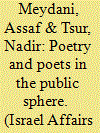

|
|
|
|
|
| Publication |
2014.
|
| Summary/Abstract |
Political poetry is not tested by its impact and the number of its readers but in its very participation in the public discourse on the issues of the day. Poetry moves between forces that focus the attention of its audience inwards, to the lyrics of the poems, and the forces that connect to the social, cultural, and political climate in which the poems are published. These movements reflect the power of poetry, which, using language, breaks the barriers that exist between people - individuals or groups, as well as between these individuals or groups and reality. This way, the poet serves as the element that formulates the informal cultural feelings in society and offers an interpretive package of the existing reality, as well as the alternative reality. Poets place their 'truth' within the perception of reality, and this truth can compete in the public arena with the 'truth' that is portrayed by politicians.
|
|
|
|
|
|
|
|
|
|
|
|
|
|
|
|
| 12 |
ID:
128221
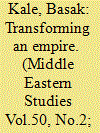

|
|
|
|
|
| Publication |
2014.
|
| Summary/Abstract |
The Ottoman Empire's immigration and settlement policies were redefined in the nineteenth and early twentieth centuries as a result of the population movements caused by the rise of nationalism, wars and territorial losses. With changing demographics and the acceptance of a new citizenship concept by the Tanzimat Edict in 1839, the millet system which had previously secured the multi-ethnic and multi-religious nature of the empire for centuries was challenged. The central argument of the paper is that the Ottoman state responded to these challenges by supporting a liberal migration and settlement policy in an institutionalized and highly complex structure through the pioneering Ottoman Migration Commission. Although certain restrictions later took place due to internal and external factors such as a changing economic, social and political climate, the institutionalized settlement and migration policy proves that a multi-dimensional system was developed in response to the challenges of a dissolving and yet transforming Empire.
|
|
|
|
|
|
|
|
|
|
|
|
|
|
|
|
|
|
|
|
|